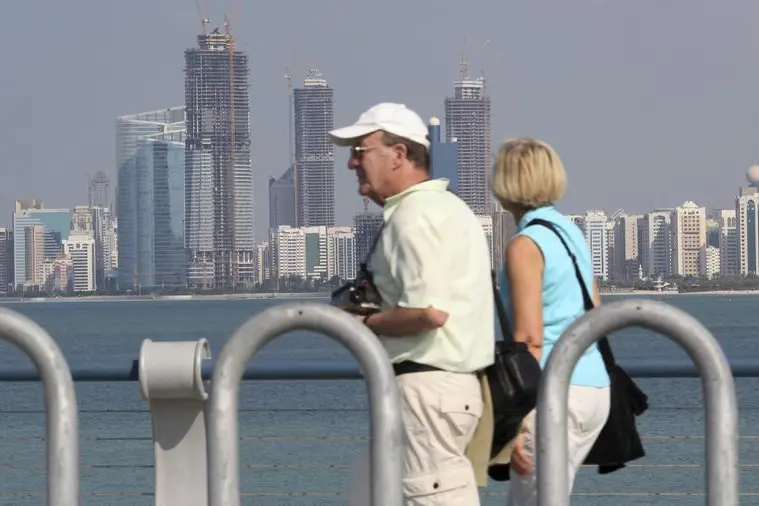PHOTO
Focused on boosting visitor numbers and overall investment in the tourism sector, Abu Dhabi has announced a reduction in fees placed on hotels, as well as funding for a three-year promotional campaign.
On March 12 the Department of Culture and Tourism – Abu Dhabi (DCT Abu Dhabi) announced wide-ranging cuts to taxes imposed on the hospitality sector.
Among the changes was a reduction of tourism and municipal fees levied on hotels, from 10% to 5.5%; a cut from Dh15 ($4.80) to Dh10 ($2.72) in the daily fee for each hotel room; and the abolition of all tourism and municipality fees on tourist attraction tickets sold by hotels.
Another measure, exempting visitors from the municipal fee if they stay 30 or more consecutive nights, seeks to encourage more long-term stays.
Announcing the changes, Saif Saeed Ghobash, undersecretary at DCT Abu Dhabi, said that there was a need to provide the sector with support to help it maintain momentum and increase the emirate’s profile.
“The initiatives will encourage local, regional and international tourism investment within the emirate, and help enhance Abu Dhabi’s position as a global tourist destination,” he said.
Ghobash added that the lowering of fees should lift the sector’s competitiveness by giving operators access to more capital to reinvest in their businesses.
While it has been estimated that changes will impact public earnings from the sector to the tune of Dh1bn ($272.3m) over the next three years, the projected increase in visitor numbers and hotel guest nights could more than offset this.
New fund for tourism promotion
Seeking to build on the momentum the levy reductions may create, DCT Abu Dhabi also announced it would be allocate Dh500m ($136.1m) through to the end of 2021 for tourism promotion activities.
Of this total, 40% is to be spent this year, partly in an effort to leverage neighbouring Dubai’s hosting of Expo 2020 by boosting awareness of Abu Dhabi’s attractions and encouraging visitors to extend their stay.
Another 25% will be spent next year, with the remaining Dh175m ($47.7m) allocated for promotional campaigns in 2021.
The authorities have identified seven key target markets for their promotional efforts: China, Germany, India, Russia, Saudi Arabia, the UK and the US.
Supporting diversification efforts
Tourism has been identified as a key sector in the emirate’s plan to drive economic growth and diversify its economy.
Abu Dhabi attracted 10.3m international visitors last year, according to a statement issued by DCT Abu Dhabi on February 27, with the figure combining both day-trip tourists and those staying overnight.
The emirate’s accommodation segment was one of the main beneficiaries of this strong inbound flow. Some 5.1m people made an overnight stay in hotels within the emirate last year, up 3.9% on 2017, which itself was a 9.8% increase on the year before, suggesting the government’s overall strategy is bearing fruit.
The emirate as a sports and events venue
Its credentials as a sporting and events venue constitute one pillar of Abu Dhabi’s tourism promotion platform, and will support continued growth in arrival numbers.
One recent event was the successful staging of the 50th anniversary instalment of the Special Olympics, held between March 14 and 21.
More than 7000 competitors representing 195 countries, along with some 4000 coaches, family members and official guests, came to Abu Dhabi for the 2019 games, swelling visitor numbers and raising the emirate’s profile as a sporting destination.
“The Special Olympics held in Abu Dhabi in March not only highlighted the emirate’s efforts to become a centre for sporting events, but it also helped project an image of inclusion and tolerance,” Abdullah Al Humaidan, the general secretary of Zayed Higher Organisation for Humanitarian Care and Special Needs, told OBG. “Both aspects have an impact on raising the emirate’s profile globally as a touristic destination.”
The Special Olympics came on the heels of the 2019 Asian Football Confederation Asian Cup, hosted by Abu Dhabi and other emirates of the UAE. The four-week event closed with the final on February 1 at Abu Dhabi’s Zayed Sports City Stadium.
The 51-game tournament was watched by nearly 650,000 spectators in the stands, and millions more via TV and online broadcasts.
While final viewing figures have not been compiled for the 2019 tournament, its predecessor in Australia attracted almost 1.2bn terrestrial and online viewers. The UAE event is likely to have greatly exceeded that total, given that the 2015 competition featured only 16 teams.
Along with regular international sporting activities hosted by the emirate, such as the Formula 1 Etihad Airways Abu Dhabi Grand Prix, to be held on December 1 this year, Abu Dhabi is developing a strong portfolio of achievements on which to base its event credentials and tourism promotion campaigns.
© Oxford Business Group 2019




















